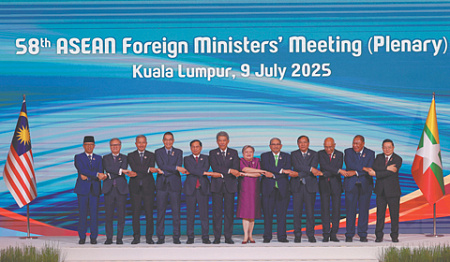
Foreign ministers from the Association of Southeast Asian Nations (ASEAN) have convened in Kuala Lumpur, facing a daunting geopolitical landscape dominated by intensifying pressure from both the United States and China. The summit’s agenda is overshadowed by two critical challenges: the threat of severe US trade tariffs and Beijing’s persistent territorial claims in the South China Sea, forcing the 10-nation bloc into a precarious diplomatic balancing act.
Opening the conference, Malaysian Prime Minister Anwar Ibrahim delivered a stark warning that global trade has been transformed into a “battleground.” Without directly naming the United States, he lamented a new era where “might is replacing principles, and the instruments that were once used to build economies are now being weaponized for coercion, containment, and isolation.” His remarks captured the anxiety gripping a region whose export-driven economies face crippling US import duties of up to 40% set to take effect on August 1, as threatened by President Donald Trump.
The Trump administration’s list targets key regional economies, with proposed tariffs of 36% for Thailand and Cambodia, 32% for Indonesia, and 25% for Malaysia. In response, Prime Minister Ibrahim urged fellow members to bolster ASEAN unity, increase intra-regional trade, and reduce strategic dependence on external powers. While most nations are engaged in separate, urgent negotiations with Washington, a unified bloc response is hoped for at a future ASEAN-US summit. To date, only Vietnam has managed to secure a deal, successfully negotiating its tariffs down from 46% to 20%.
While grappling with Washington’s economic pressure, ASEAN members must also contend with the growing influence of their largest trading partner, China. Beijing’s expanding military presence in the South China Sea remains a source of major tension, as it continues to build and militarize bases on disputed and even artificial islands. This assertive posture directly challenges the sovereignty of several bloc members, creating a complex dynamic where economic partnership is intertwined with security concerns.
The gravity of the situation is underscored by a series of upcoming dialogues between ASEAN and its global partners, including the United States, China, Russia, Japan, and the European Union. The attendance of high-level envoys such as US Secretary of State Marco Rubio, Chinese Foreign Minister Wang Yi, and Russian Foreign Minister Sergey Lavrov highlights the region’s strategic importance. Ultimately, despite aspirations for greater autonomy, the summit in Kuala Lumpur reveals an ASEAN caught in the geopolitical crosscurrents, compelled to navigate carefully between the competing interests of two superpowers.
